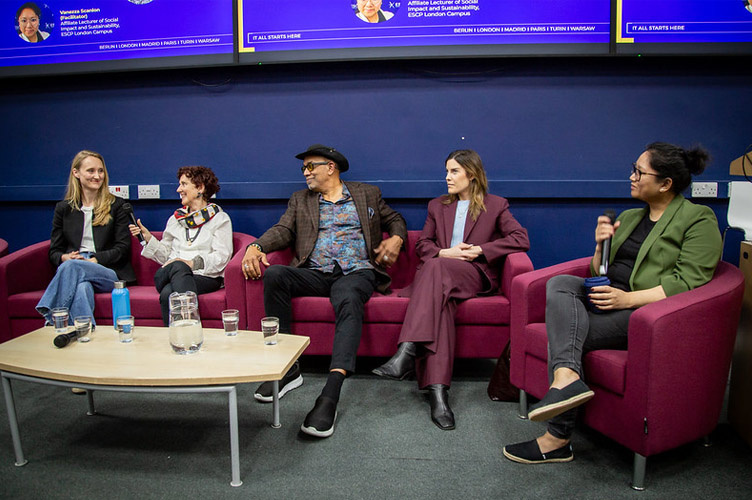ESCP London Campus hosted its 4th Annual Social Impact & Sustainability Festival from 24th to 28th March 2025.
The week featured an inspiring lineup of workshops, talks, panel discussions, curriculum innovation sessions, and faculty open hours, bringing together our vibrant community to drive systemic positive impact.
The Festival, organised by Dr Hsin-Hsuan Meg Lee, Associate Professor of Marketing, and Vanezza Scanlon, Affiliate Faculty of Marketing with focus on Social Impact and Sustainability, emphasised the need for a critical shift—from performative sustainability to purpose-driven business leadership.
We intentionally designed the Social Impact Festival to serve as a catalyst for meaningful change, and a platform to bring together our students, faculty, professionals, and thought leaders to cultivate a shared commitment to social and environmental progress. And, importantly to foster collaborations and authentic networking opportunities beyond the event week to contribute to long-term impact.
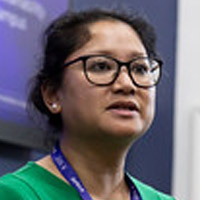 Vanezza Scanlon
Vanezza ScanlonAffiliate Faculty Marketing of Social Impact and Sustainability at ESCP Business School
We’re trying to create space for conversations that don’t just reinforce what we already believe. That’s why some sessions are open, some are required—and all are designed to push us beyond our comfort zones. Tackling sustainability and social impact means sitting with hard questions, embracing creative thinking, and making room for voices that might otherwise go unheard.
 Hsin-Hsuan Meg Lee
Hsin-Hsuan Meg LeeAssociate Professor of Marketing at ESCP Business School
Social Impact Festival: At a Glance
This year's festival, the biggest one to date, inspired the London Campus community with:
- 2 keynote speakers
- 4 expert panelists
- 4 hands-on workshops
- 18 office-hour sessions with 10 faculty members
- 1 curriculum innovation meeting
Collectively, these sessions explored key themes such as entrepreneurial talent and inclusion, social mobility and business as a force for good, balancing people, planet, and profit, and unlocking human potential.
From redefining ESG beyond compliance to exploring leadership qualities necessary for systemic change, this year's discussions challenged conventional approaches that most businesses have. Experts debated the ethical and strategic implications of AI and technology in shaping a sustainable future, and questioned how business schools can better prepare students for impact-driven careers.
The Social Impact Festival demonstrates that the social and environmental dimensions of sustainability go hand in hand. It ties ESCP in with its surrounding city communities, makes clear to students what impact means in practice, and introduces new kinds of role models—from innovating in natural fibres for big fashion brands to the criminal justice system. It is a way for ESCP to forge new narratives, strong partnerships, and cohesion of the Campus community.
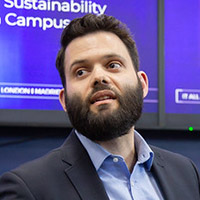 Gorgi Krlev
Gorgi KrlevAssociate Dean of Sustainability at ESCP Business School
Faculty Open Office Hours & Curriculum Innovation
Throughout the week, participants engaged directly with faculty on critical social impact and sustainability topics. These included diversity and inclusion, responsible consumption, business sustainability, circular value chains, sustainable finance, corporate responsibility, and employee well-being.
At the same time, a dedicated curriculum innovation session examined how programmes can continue embedding sustainability into academic practices, ensuring lasting change in business education. The discussion resulted in actionable recommendations, reinforcing ESCP’s commitment to integrating sustainability into core curricula.
Tuesday, 25 March: A Keynote and Fireside Chat
One of the Festival’s key moments was a thought-provoking keynote and fireside discussion on "The Role of Business and Leadership in Driving Holistic Impact".
The keynote session by Arnaud de Puyfontaine, President of Vivendi and ESCP Alumnus, offered insights into the evolving role of ESG in business, moderated by Kamran Razmdoost, Dean of ESCP London Campus.
The evening continued with a Fireside Chat & Panel Discussion exploring how businesses can embed authentic impact into their core strategies, going beyond compliance to create lasting social and environmental value while achieving business growth. Speakers included:
- Kathryn Eastwood, Director of Income and Employer Partnerships at EY Foundation
- Dr. Alisa Sydow, Associate Professor at ESCP Business School and Founder of Nampelka
- Dr. Kameel Khan, Founder of Project ReMake
- Dr. Carmen Hijosa, Founder & Chief Creative at Ananas Anam
Moderator: Vanezza Scanlon, Affiliate Lecturer of Social Impact and Sustainability, ESCP London Campus.
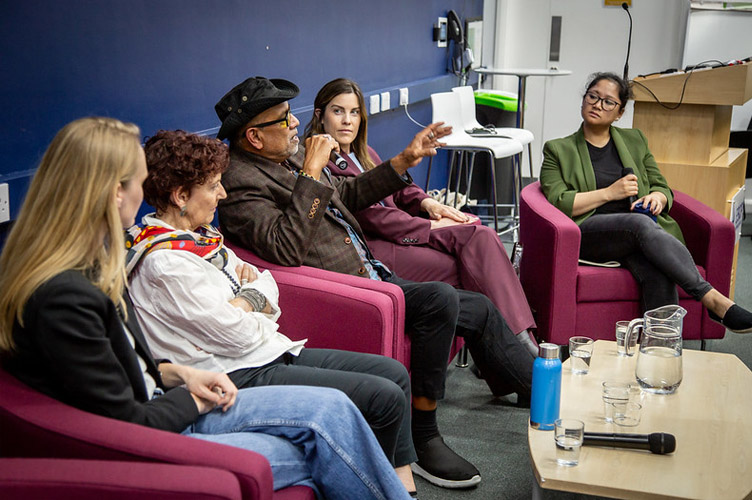
I feel honoured to have been invited to take part in ESCP’s 4th Annual Social Impact & Sustainability Festival, where my company, Ananas Anam, was used as a case study. It was clear from all presentations that ethical leadership in business was deeply embedded in every thought and discussion shared. All groups have done a thorough exploration of the challenges and opportunities, from how to reinforce the company’s market position and branding to partnerships with brands and upscaling the value chain—all considering the social and environmental responsibility and footprint.
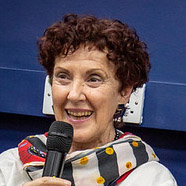 Dr Carmen Hijosa
Dr Carmen HijosaFounder & Chief Creative and Innovation Officer at Ananas Anam
Wednesday, 26 March: From Inspiration to Action
Next day, the event continued with hands-on workshops led by industry experts, business leaders, and innovators, helping students translate ideas into action:
- Impactful Collaboration for Sustainable Impact (a collaboration with Camden Council GoodLife and ESCP Blue Factory) – focused on addressing urban social impact and sustainability challenges through multi-sectoral partnerships.
- The Business Case for Inclusive Impact (with Publicis Groupe, led by Global Operations Director and ESCP Alumnus, Giri Venkatraman) – examining how businesses can embed sustainability and impact within corporate strategy.
- Behavioural Insights for Impact (with AHA! Behavioural Design, led by Vanezza Scanlon) – leveraging behavioural science to drive meaningful change.
- Tech for Change: Being Part of the Career Revolution (with Riser App, led by its Co-founders, Lamees Butt and Suz Bannister) – developing a personal impact brand to stand out authentically in the job market.
It was great to meet the students who were very creative, thoughtful and interested in the resident wellbeing framework, Good Life Camden. They gave us some wonderful ideas for how to repackage and engage with different communities, and have helped us think about the next steps for this work.
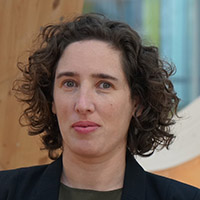 Michal Shinwell
Michal ShinwellHead of Insights, Learning and Impact at London Borough of Camden
Following workshops, students finished the day with an inspiring Keynote Session from Prof. Gorgi Krlev, Associate Professor of Sustainability and ESCP Dean of Sustainability, discussing inclusive, impact-driven leadership and the role of education in fostering sustainable change across industries.
Attending the Social Impact Festival was an eye-opening experience. It is encouraging that an international business school like ESCP invites us to think beyond your everyday business practices that revolve around generating income and profit, and actively encourages us to reflect on the broader impact we can have on society.
The fireside chat was my personal highlight: it was intimate, inspiring, and filled with speakers who challenged the ways business is done and, with that, our perspectives. I also attended a session with the Riser App, which went beyond tech or entrepreneurship: it reminded me of the importance of authenticity, meaningful connection, and purpose-driven innovation. The keynote speeches were just as impactful, especially the reflections on inclusive entrepreneurship, reminding us that your personal values can, and should, drive business decisions.
 Sophie van Olm
Sophie van OlmMSc in Marketing & Creativity student at ESCP Business School
The Festival has long become a cornerstone of sustainability initiatives at the London Campus, reinforcing ESCP's commitment to responsible leadership and driving meaningful social impact. Throughout the week, conversations provided valuable insights and a roadmap for driving change across all industries. More importantly, the Festival highlighted that impact does not happen in isolation; it is the result of collaboration between education, businesses, policy, and value-driven leadership working together to create positive change.
Campuses
